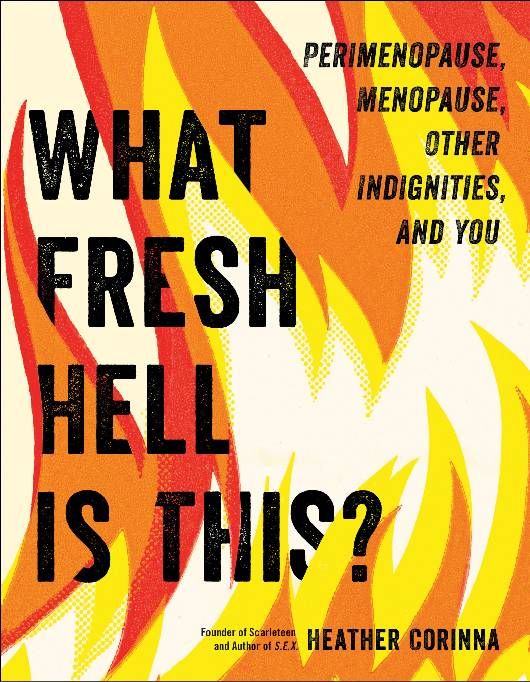What Fresh Hell Is This? Time to Educate Ourselves About Menopause
A Q&A with author Heather Corinna about why health care providers struggle to support patients going through perimenopause and menopause
Editor’s note: In honor of Menopause Awareness Month, we are running a series of stories about menopause. Our goal is to illuminate a topic that is sometimes shrouded in misinformation and shame. We hope to change that.
In November of 2013, Heather Corinna, then 43, went to the doctor at a local clinic with dizziness, trouble breathing and an intense feeling of heat. After examination, the doctor sent Corinna to the emergency room by ambulance. There, they saw around 10 different health care providers and had tons of tests done. Corinna says, "I remember hearing a lot about how this was so confusing, how they couldn't figure out what was going on, what a mystery it all was."

Despite Corinna's age, assigned sex and presentation of symptoms, no one mentioned perimenopause as a possibility. Considering that two million people go into perimenopause each year in the United States alone, it was surprising that no one connected the dots.
The experience led Corinna to write their recently published book, "What Fresh Hell Is This?." The longtime queer feminist activist, founder and director of the sexual health and relationships website Scarleteen and author of "S.E.X.," says, "Until perimenopause happened to me, I didn't think much about menopause or perimenopause, which says a lot. As a sex educator and author, I should have been covering this topic before now."
Next Avenue talked to Corinna about her book.
Next Avenue: What surprised you most about perimenopause?
Heather Corinna: The whole thing surprised me. I felt so foolish — almost everything I knew about menopause was wrong. For example, I assumed issues like hot flashes and mood swings happened post-menopause, not in the years leading up to it. I was completely unprepared.
"We are told we no longer meet the ideals of beauty and that we need to lose weight... It's the perfect setup for marketers to prey on our insecurities."
It does seem like sex education starts with puberty and ends with reproduction. Why don't people talk more about what is happening in our bodies at this stage?
The simplest explanation is a combination of sexism and ageism. The conversation stops after reproductive age; our culture often presents post-menopausal people as no longer important, sexual or attractive. Compared on the whole to cisgender men, you become devalued in our white, western, colonial culture after a certain age.
Hot flashes and mood swings are typical effects that we think of during menopause. But what are some less-known impacts on the body caused by fluctuating levels of estrogen and progesterone?
I didn't know anything about perimenopause, including that I was in it until I was already in it for several years. We all experience the menopausal transition differently. Personally, I was experiencing various impacts, including digestive issues, night sweats, increased headaches, body composition changes, anxiety and cognitive challenges.
In the book, you note that the second-biggest risk group for eating disorders after adolescence is people in perimenopause. Why is that?
It's most common in and around menopause for body composition to change to a balance of less lean muscle and more body fat. It's also common to gain weight. You may find you have a belly even though you never had one, if you already did, that you get wider in the middle.
To make it worse, we are assaulted by marketing that intentionally targets us. We are told we no longer meet the ideals of beauty and that we need to lose weight. Add in the hormonal changes can make us moody, depressed, low energy — it's the perfect setup for marketers to prey on our insecurities.
Just like during puberty, hormone fluctuations also make us feel out of control. So we may try to regain control through our food intake, leading to disordered eating.
What about the impacts of menopause and the menopause transition on sex?
At every stage of life, sex changes — and there are ebbs of flows. Getting older, and the menopausal transition, presents its own challenges. One of the upsides to this time of life is that we can re-write the road map of our sex lives. I say in the book, 'It's so hard to have a good time sexually when we are trying to be perfect… If menopause is making us hard to bring this kind of perfectionism to our sexual selves and our lives, it's doing us a favor.'
We get to re-create our sexual road map, if we want to or need to. For instance, sex doesn't have to start a certain way or finish a certain way or include certain acts to be pleasurable. We get to decide what we like and what we don't — and those likes and dislikes can change over time and with every encounter. Some of the people having the best sex of their lives are postmenopausal!
Glossary of Terms
LGBTQ | An acronym for lesbian, gay, bisexual, transgender and queer
Cisgender | A term used to describe a person whose gender identity aligns with those typically associated with the sex assigned to them at birth
Gender identity | One's innermost concept of self as male, female, a blend of both or neither – how individuals perceive themselves and what they call themselves; one's gender identity can be the same or different from their sex assigned at birth
Non-binary | This is an adjective describing a person who does not identify exclusively as a man or a woman; non-binary people may identify as being both a man and a woman, somewhere in between or as falling completely outside these categories. While many non-binary people also identify as transgender, not all do. Non-binary can also be used as an umbrella term encompassing identities such as agender, bigender, genderqueer or gender-fluid.
Queer | This is a term people often use to express a spectrum of identities and orientations that are counter to the mainstream. Queer is often used as a catch-all to include many people, including those who do not identify as exclusively straight and/or people who have non-binary or gender-expansive identities. This term was previously used as a slur, but has been reclaimed by many parts of the LGBTQ movement.
Sex assigned at birth | The sex, male, female or intersex, that a doctor or midwife uses to describe a child at birth based on their external anatomy
Transgender | This is an umbrella term for people whose gender identity and/or expression is different from cultural expectations based on the sex they were assigned at birth. Being transgender does not imply any specific sexual orientation. Therefore, transgender people may identify as straight, gay, lesbian, bisexual, etc.
Transitioning | It's a series of processes that some transgender people may undergo in order to live more fully as their true gender. This typically includes social transition, such as changing name and pronouns, medical transition, which may include hormone therapy or gender affirming surgeries, and legal transition, which may include changing a legal name and sex on government identity documents. Transgender people may choose to undergo some, all or none of these processes.
Source: Human Rights Campaign
Many people believe their choice for dealing with the impacts of menopause and the transition to menopause is either to take estrogen therapy or no estrogen therapy.
Many people are wary of the pharmaceutical industry, rightfully so. But supplements or herbs, even those labeled "all-natural," are not necessarily safer or effective for every individual. People can wind up wasting a lot of money trying to avoid the medical route. They can find themselves not feeling better or making themselves sicker, so you need to be careful.

We need to learn how to take care of ourselves. Many of us have spent our lives taking care of others. It's time to set boundaries and prioritize our own needs. Basic self-care (like getting more sleep, decreasing stress, movement and emotional support) doesn't cost anything and can help.
If you find yourself struggling, talk to a health care provider. Do your research! You don't want to see just anybody, so ask for recommendations. Make a few calls and set up interviews. Remember, you are hiring a provider for a job so you want them to be qualified, to listen and be knowledgeable. (Hormone therapy is very different than it was sixty years ago.)
Often, menopause gets defined by losses – loss of a menstrual cycle, loss of the ability to reproduce. Can there be an upside?
Yes! So many cultural ideals center around youth and beauty. Some of us spent our youth trying to attain these ideals (we don't feel pretty enough or constantly buy into diet culture, etc.) without meeting them. Those who once met these ideals may feel a loss that they aren't attractive as they once were.
But instead of seeing it as a loss, why not reframe it as a gain? A chance to re-write the narrative. In the book, Joanne Mason, says, 'As a post - surgical trans woman in my 70's … I find being an older trans woman a freeing experience. I am no longer preoccupied with old uncertainties (Am I feminine enough? Do I pass?) and self-doubt.'
Instead of being locked in a cage, menopause opened the cage door It liberated Joanne and it can liberate all of us — from having to conform to society's ideas on beauty, how we should live our lives, and what it means to be sexual and erotic. We get to write our own script on what is next for us.


